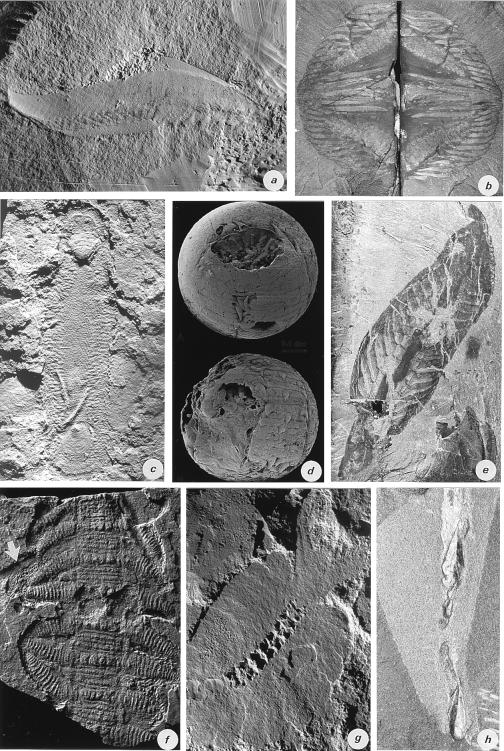Figure 2.
Representative Cambrian animals from Burgess Shale-type deposits (all except d) and an example of early phosphatization (d). (a) The agnathan chordate Myllokunmingia fengjiao from the Lower Cambrian (lower Botomian) Chengjiang lagerstätte, at Haikou near Kunming, Yunnan, China. The photograph is courtesy of D. Shu (North-West University, Xilan, People's Republic of China). (b) The holotype and only known specimen (part and counterpart) of the ctenophore Fasciculus vesanus from the Middle Cambrian Burgess Shale lagerstätte, at Field in British Columbia, Canada. (c) The halkieriid Halkieria evangelista from the Lower Cambrian (upper Atdabanian) Sirius Passet lagerstätte in Peary Land, North Greenland. (d) Phosphatized embryos, possibly of a halkieriid, and referred to as Markuelia secunda from the Pestrotsvet Formation (Tommotian) of south-east Siberia. The figures show views of two embryos that are wrapped around the surface. The photograph is courtesy of S. Bengtson (Swedish Museum of Natural History, Stockholm). [Reprinted (abstracted/excerpted) with permission from ref. 37. Copyright 1997, American Association for the Advancement of Science.] (e) The Ediacaran survivor and presumed anthozoan (Cnidaria) Thaumaptilon walcotti from the Middle Cambrian Burgess Shale lagerstätte, at Field in British Columbia, Canada. (f) The lobopodian Hadranax augustus from the Lower Cambrian (upper Atdabanian) Sirius Passet lagerstätte in Peary Land, North Greenland. The photograph is courtesy of G. Budd (Uppsala University, Uppsala). (g) The primitive arthropod Kerygmachela kierkegaardi from the Lower Cambrian (upper Atdabanian) Sirius Passet lagerstätte in Peary Land, North Greenland. The photograph is courtesy of G. Budd. (h) The posterior trunk of the priapulid worm Ottoia prolifica from the Middle Cambrian Burgess Shale lagerstätte, at Field in British Columbia, Canada. The specimen shows the intestine and three hyoliths, interpreted as ingested prey. (a, ×2.0; b, ×0.3; c, ×0.8; d, ×55; e, ×0.3; f, ×0.8; g, 0.9; h, ×1.9.)

